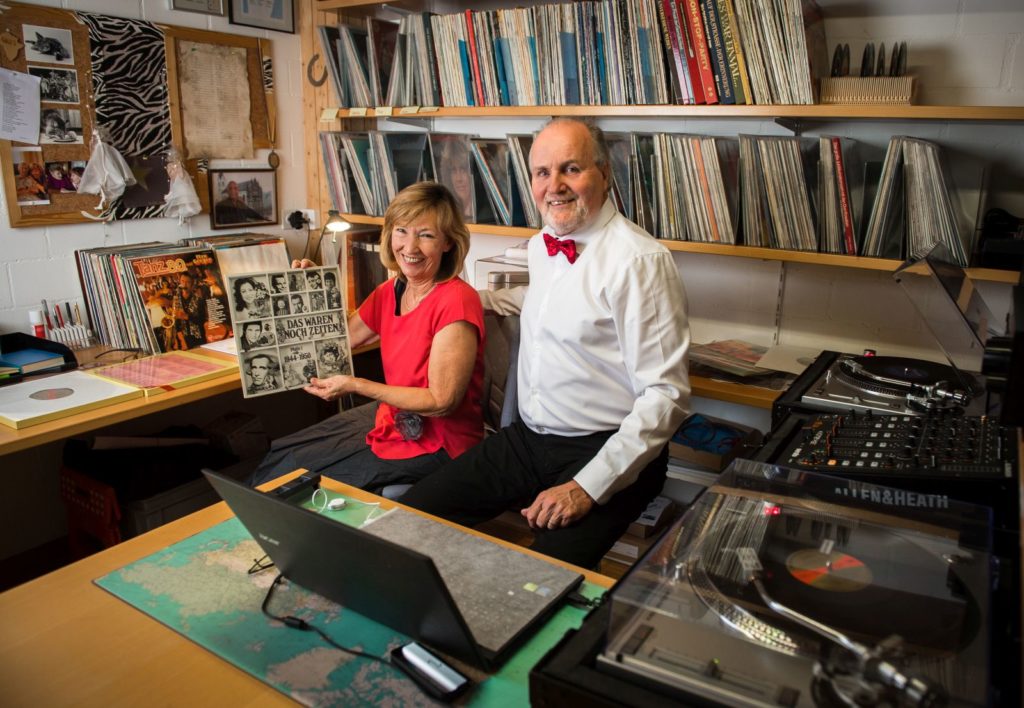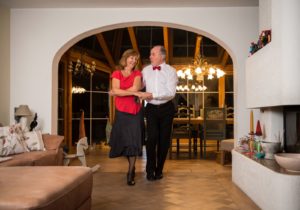Dancing to forget forgetfulness [Beat G. Berger]
Esther and Beat Berger from Gossau launched “Josefina’s Tanzcafé” on 18.11.2016. This is a dance afternoon outside of nursing homes and old age homes, which should provide dementia seniors an exit as in their youth!
When Clara prepares to go out, she lays out her dancing shoes and puts on her best dress. Clara suffers from Dementia. If you talk to her, you will notice this quickly. The illness affects her brains speech centre and she probably notices this herself. For her conversation is difficult, but not going out to dance. Because there she can enjoy music and dance – and be herself or the person she once was.
Clara loves going to “Josefina’s Tanzcafé”, which takes place once a month in the Protestant Church Community house in Gossau. The initiators are Esther and Beat Berger from Bertschikon, a village close by. They are also both retired. Esther Berger worked for 40 years in adult nursing and for many years she thought about organizing activities for people with Dementia “when I finally have the time to not-to-work any longer”. Her wish: integrating Dementia patients into everyday life again. “They are confined to their apartments and care homes – and considered a nuisance with their walkers and their slowness. People look down on them”.

Beat Berger has a different experience with Dementia sufferers. Originating in the HVAC-working industry, he’s a textbook entrepreneur with many years of management experience working abroad and in Switzerland. He founded and built up his own company, which he sold upon retirement. “Initially, I couldn’t relate to the topic of dementia” he says. Then on Sundays, he started visiting the nursing home his wife was in charge of, to get in contact with the patients. An elderly lady asked him “Do I know you?” and a conversation began. In between he went into his wife’s office and when he returned 15 minutes later, the lady was still standing there and repeated: “Do I know you?”.
Beat shrugs his shoulders: “that was something new for me, a world that I’m not familiar with. How do you react, how do you communicate with such people?” He came back for more visits and learned how. He explains: Basically, Dementia sufferers need only two things from you: your time and an open ear. He began to play games with them and to listen to their life stories.
“My husband is open-minded and enthusiastic” explains Esther Berger. Which is why he immediately agreed to help her with her idea for a dance café for Dementia patients. This idea was based on two others. One a project in England, which Esther came across thanks to a BBC documentary. “In various English towns a project was started called ‘Singing against Dementia’ and patients were encouraged to ‘join the music’. A second inspiration was a dance cafe for Dementia patients in nearby Zurich-Oerlikon, organized by the former radio commentator Verena Speck. We visited her venue and liked the concept. The couple had to start from scratch. There were some modest funds due to an inheritance from Esther’s mother who died in January 2016. “My mother had a soft spot for marginalised groups and individuals. I’m sure she would have frequently come to our events, that kind of thing would have very much appealed to her”.

Esther and Beat purchased some initial equipment for their project: two LP-turntables, a mixing console, loudspeakers, some decorations and of course a LP-record collection of popular music from the 60’s & 70’s. The name for the project was clear from day one: Esthers mother was called Josefina – and she was the inspiration for the project: “Josefina’s Tanzcafé” was born.
The roles are clearly defined. Beat is DJ and handles most of the administrative work. His wife is the animator, since she knows how to integrate and motivate the participants. This has its challenges: “the elderly guests want to participate actively. If this takes too long, they start to complain that the music is too loud and become impatient. To get them engaged the music program needs to be well thought out. “Which takes some planning” Beat explains. He prepares a two-hour program by writing down each song in order. There are plenty of popular songs – starting with German singers such as Freddy Quinn and Peter Alexander. Added to the mix are English Pop songs from ABBA, the Beatles plus some Swiss folk music favourites. “That’s what people want to hear”. And as a highlight in the middle of the program they also organise a Polonaise dance.
The result is a hit and not just for Clara. “More and more people are participating” says Esther. An assisted living group for mentally handicapped are now also regular visitors. “This was a bit risky, since dementia sufferers are neither very tolerant or politically correct”. Additionally dementia patients, who live at home also participate. “They come with their partners, which is a great break for both, since the normal communication barriers fall away” says Beat. “For a couple of hours both can engage on the same level, like before the illness. Maybe the handicapped partner can take the lead in dancing, something no longer possible during everyday life.”
Some participants who normally can hardly string two words together, then sing whole songs. This phenomenon has been researched: dementia impacts the brains speech centre, but not a person’s ability to remember the lyrics of a whole song, which are stored in a “music centre” of the brain, an area not affected by the disease. “That is why music is a window into world for dementia patients”. And that is why the “Josefina’s Tanzcafé” is a success.
This hasn’t gone unnoticed by other institutions and the Berger’s have received many requests. One year on, they have organized more than half a dozen venues, in addition to their normal Tanzcafé events. “We could do a lot more, but we don’t want too much stress” This since a two-hour event means a full day’s work – from decorating the location to handling and transporting the music equipment.
Hence, they would welcome others who are willing to organize similar events. “We’re not interested in money, but in providing the opportunity for Dementia sufferers to find an outlet and some enjoyment. Therefore, further competitors are welcome”. After all, the demand is higher that they can meet and others offering the same opportunity are few and far between. Currently, Dementia sufferers in the region have the opportunity to dance once a month, despite how much they love the event. Just like Clara: A break from the daily routine of waiting in care homes and institutions. Waiting for the next meal, for bed-time and ultimately for life to end. Meanwhile come dancing and take a trip down “memory lane”. With Mireille Mathieu or Udo Jürgens. Or Trio Eugster, the Swiss Backstreet Boys from way back when.
| Text: | David Kilchoer – Editor of newspaper |
| Pictures: | Seraina Boner |
| Publisher: | Newspaper ‘Zürcher Oberländer’ and ‘Anzeiger von Uster’ |
| Josefina’s Tanzcafé: | www.tanz-cafe.ch |
| Supported by: | Round Table und Old Tablers – Club 41 Zurich 31 |
| download: | Artikel Zürcher Oberländer 18.11.2017 |


